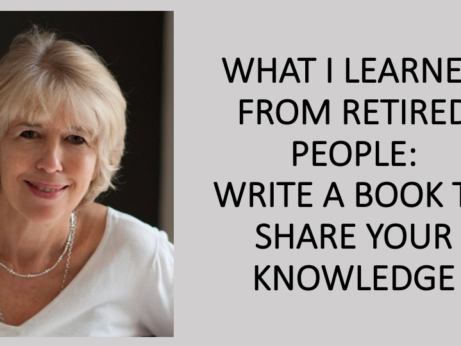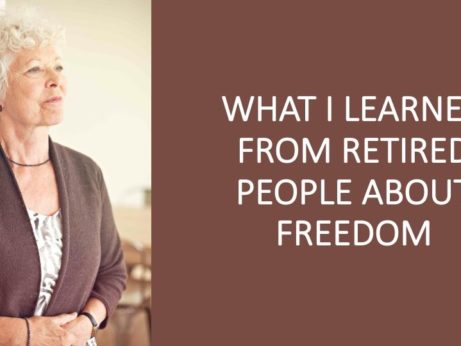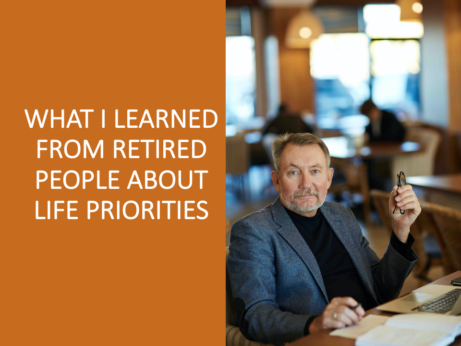What I Learned From Retired People About Finding a New Identity

Have you ever wondered who you are?
Yes? No? All the time?
So, who are you?
- Are you a man/woman, a spouse, a daughter/son, a mother/father, a friend?
- Are you your job title? Sales Director, Senior Consultant, CEO, software architect, tech start-up co-founder?
- Are you your key characteristics: kind, friendly, hard-working, busy, always searching for something, creative, confused, confident?
- Are you INFJ, ENTP, ESPJ, or any other MBTI profile?
- Are you what you think about life, the world, yourself, other people?
- Are you what you show to the world or what you believe you are?
Who are you? What is your identity? And what happens when you don’t know any more who you are?
When I interviewed people in retirement, the topic of identity came up as a bombshell in this sentence:
“When you are employed, you have your position, your badge, your place, your colleagues. When you retire, you go from somebody to nothing.”
It can be especially hard if you love your work. If your job is part of your identity. If your work gives you a lot of positive mental stimulation and personal satisfaction.
Leaving your successful career behind can trigger a lot of questions, even an identity crisis. Who am I? Where do I belong to? How can I feel good in my own skin again?
Let’s have a look at the identity crisis itself
What are possible causes of identity crisis?
You can check this great article on Identity Crisis: Definition, Symptoms, Causes, and Treatment published on healthline.com. Typically, big life changes and certain age (midlife crises) can trigger identity crises. For example:
- getting married
- getting divorced or separated
- moving
- experiencing a traumatic event
- losing a loved one
- losing or getting a job
- new health issues
I’d like to add to the list also:
- relocating to a new country
- major life plans not coming through
- retirement
How do you know if you are going through an identity crisis?
Per earlier mentioned healthline.com article the signs are the following:
- You’re questioning who you are — overall or with regards to a certain life aspect such as relationships, age, or career.
- You’re experiencing great personal conflict due to the questioning of who you are or your role in society.
- Big changes have recently occurred that have affected your sense of self, such as divorce.
- You’re questioning things such as your values, spirituality, beliefs, interests, or career path that have a major impact on how you see yourself.
- You’re searching for more meaning, reason, or passion in your life.
Let’s pause a bit and take a step back.
Is it bad to go through an identity crisis and question who you are?
I believe not! As human beings we are constantly growing, expanding our understanding of self and the world. And the identity crisis is a deep process of questioning our values, beliefs and life goals. Questioning that opens our mind to new insights, perspectives and takes us to the next level.
Natali Morad in her blog post How To Be An Adult— Kegan’s Theory of Adult Development summarizes Dr. Robert Kegan’s Theory on how adults go through 5 distinct developmental stages (just like children).
The theory tells me that questioning who we are is the best way to move to a higher developmental stage.
What are the stages and what happens there? Check more details in Natali’s article, but what she describes is the following:
- Stage 1 — Impulsive mind (early childhood)
- Stage 2 — Imperial mind (adolescence, 6% of adult population)
- Stage 3 — Socialized mind (58% of the adult population)
- Stage 4 — Self-Authoring mind (35% of the adult population)
- Stage 5 — Self-Transforming mind (1% of the adult population)
What stage of development are you at?
STAGE 2 — Imperial mind (adolescence, 6% of adult population)
- In Stage 2, the emphasis on one’s own needs, interests and agendas is primary.
- Stage 2 individuals view people as a means to get their own needs met, as opposed to a shared internal experience (how we feel about each other).
- They care about how others perceive them, but only because those perceptions may have concrete consequences for them.
STAGE 3 — Socialized mind (58% of the adult population)
- The most important things are the ideas, norms, and beliefs of the people and systems around us (i.e. family, society, ideology, culture, etc. ).
- At this stage, we look for external validation to derive our sense of self. We try to fit in.
- It may be difficult to answer the question: what do I want? We’re too busy focusing on others’ expectations or societal roles.
STAGE 4 — Self-Authoring mind (35% of the adult population)
- We can question expectations and values, take stands, set limits, and solve problems with independent frames of mind.
- By exploring our own thoughts and feelings, we create our own sense of authority or voice.
- We can take responsibility for our own inner states and emotions.
- We generate our understanding of the world.
- We realize that we’re always changing, that who we are is something that we can still negotiate.
STAGE 5 — Self-Transforming mind (1% of the adult population)
- We are both self-authoring and willing to work with the authority of others. We can not only question authority but also question ourselves.
- At this stage, our sense of self is not tied to particular identities or roles. We are no longer held prisoner by our own identity. We see the complexities of life, can expand who we are, and be open to other possibilities — we are reinventing our identity.
- We can hold multiple thoughts and ideologies at once. We can understand things from many different perspectives.
Ready to get to the next level of your development and find your new identity?
Ready to bust through all your own myths about who you are or who you should be? Ready to find more purpose, alignment, and peace?
Then ask yourself some of the following questions as recommended by the healthline.com and combined with my own questions:
- What are the goals that you can truly commit to? (Erikson says that a well-developed identity is comprised of goals, values, and beliefs to which a person is committed. An identity crisis can come from the fact that the whole life you were chasing certain goals that you don’t find meaningful anymore and now it’s difficult to decide which goals you can truly commit to)
- What are your values? How do you live these values? Is anything working in opposition to them? (knowing, understanding, and committing to your values help you commit to your goals)
- What did you believe in the past? What do you believe now and what do you want to believe in the future?
- What qualities and characteristics define you? How has this changed over the years?
- If you’re experiencing a major life change: How have things changed for you? Are you content with these changes? How can you cope with these new things occurring?
- What are your interests, passions, and hobbies? Are you doing what you like to do, and if not, why not? (If you love to play tennis and haven’t for several years, what factors are preventing it?)
- What facade do you put in front of other people, why do you do that and who you really are?
- Around your purpose: What do you bring to the world? What makes you happy and fulfilled?
If you read until now, well done! The topic of identity is a huge topic, in the same way as going through an identity crisis.
It can be a long, frustrating process. It helps when you get supported by a therapist or a coach. I went through my own identity crisis in my 40’s and I was grateful for all the support I had. It felt like going through muddy waters.
But the journey is worth it. It’s cleansing, rejuvenating, and liberating. Always remember that there’s a special gift at the end: getting to another level of your development and discovering another level of your inner freedom. If you haven’t read my article on freedom, make sure you check it out.



